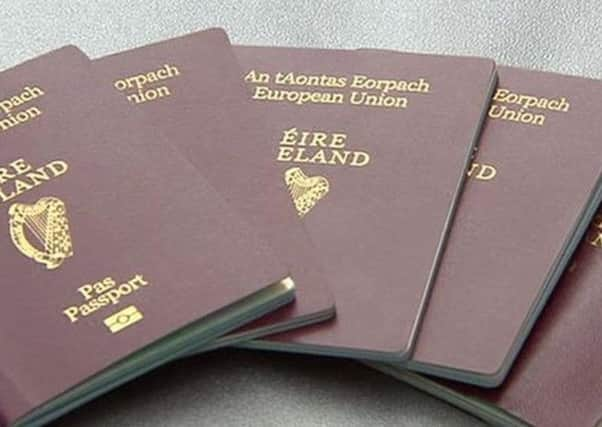DUP: UK citizenship rules cannot erode principle of consent


A campaign – led by immigration activist Emma DeSouza – has claimed a change in the UK’s immigration rules means that NI-born Irish nationals will not be considered EEA (European Economic Area) nationals in the UK post-Brexit.
The Co Londonderry woman said that, as a result, Irish citizens living in the UK will be unable to apply for settled status post-Brexit and will not have access to their full rights as EU citizens.
Advertisement
Hide AdAdvertisement
Hide AdShe further asserted that the birthright provisions of the Belfast Agreement – the right to identify as Irish or British or both – are being eroded.
Mrs DeSouza’s campaign has won the backing of numerous politicians, lawyers and human rights campaigners, as well as receiving widespread social media support, with hashtags such as #WeAreIrishtoo and #IstandwithEmma trending on Twitter.
There are even plans for rallies in Belfast and London at 12pm on Saturday, which organisers say will “highlight the failure of the Government to recognise the EU rights of Irish citizens born in Northern Ireland post Brexit”.
Prime Minister Theresa May said on a visit to Belfast in February there would be a review into how Brexit is affecting Irish citizens’ rights in NI.
Advertisement
Hide AdAdvertisement
Hide AdBut DUP MEP Diane Dodds warned that Brexit must not be “cynically exploited to seek serious and irreversible changes to UK citizenship laws which would set Northern Ireland adrift from Great Britain”.
She claimed that the UK leaving the EU “does not impinge on a person’s right to identify as British or Irish”.
Mrs Dodds highlighted Paragraph 1 (vi) of the section on constitutional issues contained in the 1998 agreement, which confers upon citizens ‘their right to hold both British and Irish citizenship’.
“Importantly,” she added,”this does not say British or Irish citizenship. Therefore most people born in Northern Ireland are entitled automatically to Irish citizenship, but this is in addition to, and not instead of, British citizenship.
Advertisement
Hide AdAdvertisement
Hide Ad“These arrangements are consistent with the principle of consent and they should not change.”
While she said “every citizen has the right” to revoke their British citizenship should they also hold Irish citizenship, Mrs Dodds added: “This doesn’t require complete regime change which would place a wedge between those born in Northern Ireland and other parts of the UK.”
And she said her party will stand against such a move, which Mrs Dodds claimed would “erode Northern Ireland’s place in the Union and rewrite the terms of the Belfast Agreement”.
“We would call on the Prime Minister to do likewise,” she added.
Advertisement
Hide AdAdvertisement
Hide AdMeanwhile, TUV leader Jim Allister branded Mrs DeSouza’s campaign over Irish citizenship rights as “wholly bogus”.
He told the News Letter: “The attempted hysteria over this issue is a classic case study in the much sought victim mentality of those who love to parade their Irishness but cling to the British pound.
“This is a wholly bogus scare story which only succeeds in illustrating the ignorance of those who peddled it.
“The exclusion of British citizens from Northern Ireland (which means everyone born here), who exercise their right to proclaim themselves as ‘Irish’, from the definition within the UK of EEA citizens is, of course, because they are already UK citizens and, therefore, do not need the special dispensation afforded by these rules to EU citizens.
“Far from any diminution of rights, this underscores that of which these people complain they already have,” he concluded.